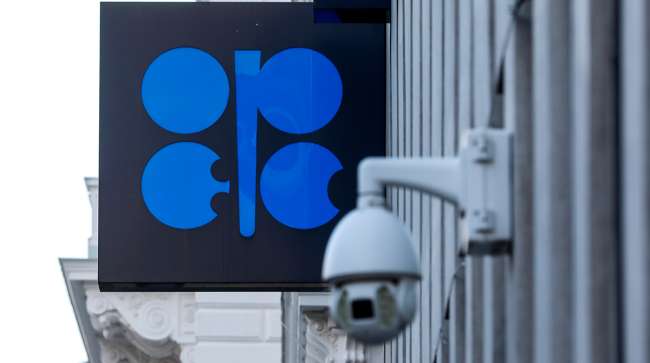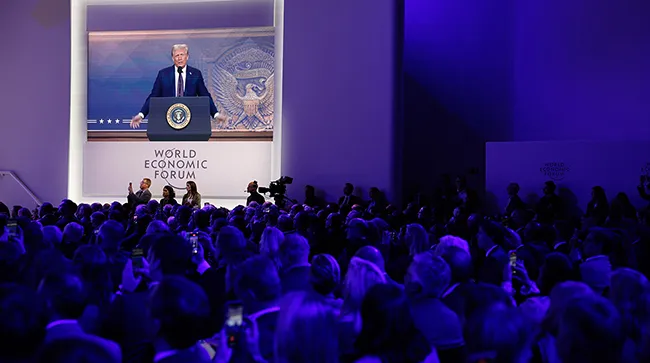Bloomberg News
Trump’s Return to OPEC Politics Complicates Oil Talks

[Stay on top of transportation news: Get TTNews in your inbox.]
U.S. President Donald Trump has raised the stakes for a meeting of an OPEC+ ministerial panel next month, with his call for the group to lower oil prices.
Just days into his second term, Trump told world leaders gathered in Davos, Switzerland, that he would urge Saudi Arabia and its partners to “bring down the cost of oil.”
Delegates from the group said they would stick to their existing plans, but Trump’s intervention at the World Economic Forum on Jan. 23 adds significance to what had been looking like a routine committee meeting to review policy on Feb. 3.
The Organization of Petroleum Exporting Countries and its allies have been withholding oil supplies for more two years to shore up prices, and have repeatedly delayed a revival in their output. They currently intend to gradually start restoring barrels in monthly tranches of about 120,000 barrels a day from April.

Donald Trump makes a virtual address to the World Economic Forum in Davos, Switzerland, on Jan. 23. (Stefan Wermuth/Bloomberg)
Neither Riyadh nor OPEC’s Vienna-based secretariat gave any indication that they would expedite these plans in response to Trump’s demands. Delegates from the alliance, who asked not to be identified, said they see no reason to deviate from their current policy. Faltering fuel demand in China and plentiful new supplies from across the Americas mean there is still the risk of an oil surplus, they said.
Oil prices are trading near $78 a barrel in London, up from the start of the year but still too low for many members of the cartel to cover government spending.
“OPEC+ seemingly has no appetite” to “put additional barrels on the market,” said Helima Croft, head of commodity strategy at RBC Capital Markets.
Other U.S. polices could upend this outlook.
Sweeping new U.S. sanctions on Russia — another OPEC+ member — announced in the final days of the Biden administration has spurred its customers in Asia to scour for alternative supplies. Furthermore, Trump has threatened to renew a campaign of “maximum pressure” to rein in nuclear activity by Iran, a policy that crushed the Islamic Republic’s crude exports during his first term.
David Bell, CEO of CloneOps.ai, discusses the impact of AI on the trucking industry. Tune in above or by going to RoadSigns.ttnews.com.
“So far we’re seeing no indications from OPEC that they are willing to backstop any sanctions on Iran, Venezuela or Russia,” Natasha Kaneva, head of global commodities strategy at JPMorgan Chase & Co., said in a Bloomberg television interview.
OPEC+’s apparent inclination to sit tight may be guided in large part by their previous experiences with the president.
Trump — a fierce critic of the cartel for decades before his political career — often berated OPEC+ with social media posts during his first term, accusing the producers of keeping prices too high.
Skepticism in Riyadh toward the president emerged in 2018, when his administration pushed Arab exporters in the Gulf to bolster supplies in anticipation of draconian sanctions on Iran, only to soften its crackdown against Tehran at the last moment.
A further twist in the relationship arrived in 2020, when crashing oil prices during the COVID-19 crisis threatened to crush the American petroleum industry. Trump helped broker a reconciliation between Riyadh and Moscow, and ultimately usher in OPEC+’s biggest ever production cut.
Want more news? Listen to today's daily briefing above or go here for more info
There are other complications to consider, not least Trump’s pledge that his administration will encourage American oil companies to “drill, baby, drill” and ensure U.S. dominance of the global energy system.
Saudi Arabia’s Crown Prince Mohammed Bin Salman has also promised to expand investments and trade with the U.S. by $600 billion, and Trump said he would pressure the crown prince to raise that figure to $1 trillion.
“It is challenging to see how a significant drop in oil prices will yield a massive increase in U.S. output or hundreds of billions in foreign direct investment from key oil-producing states,” said Croft.





